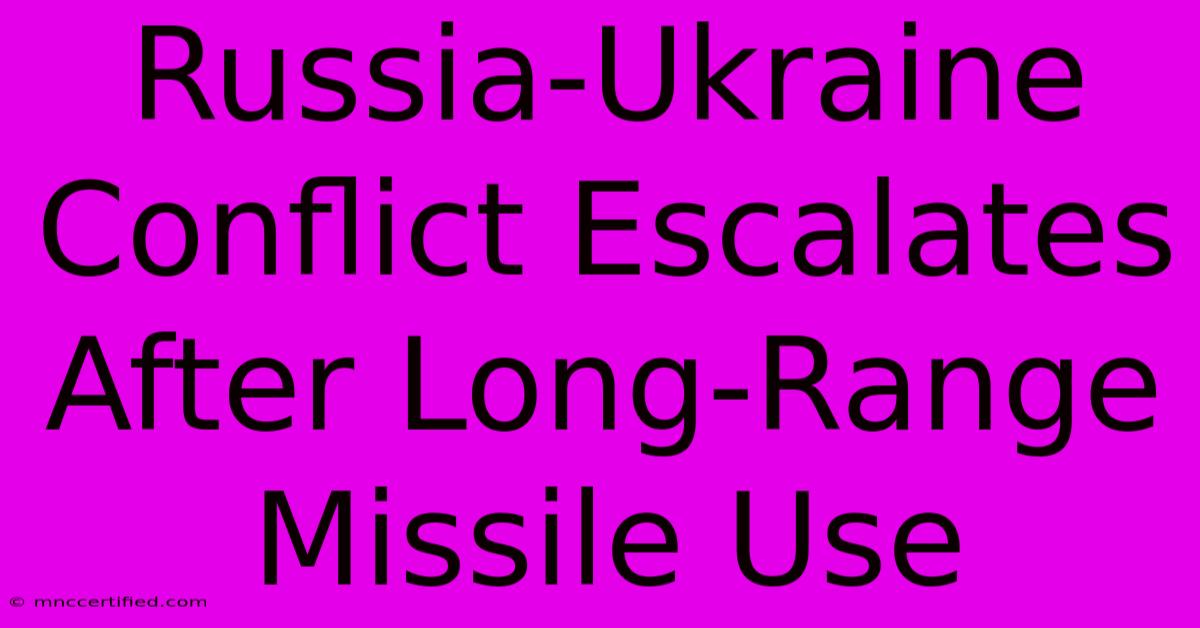Russia-Ukraine Conflict Escalates After Long-Range Missile Use

Table of Contents
Russia-Ukraine Conflict Escalates After Long-Range Missile Use
The Russia-Ukraine conflict took a dangerous turn following Russia's alleged use of long-range missiles, significantly escalating tensions and raising concerns about regional and global stability. This event marks a potential turning point in the ongoing war, demanding a closer examination of its implications.
The Use of Long-Range Missiles: A Significant Escalation
Reports indicate the deployment of long-range missiles by Russia, targeting infrastructure and potentially civilian areas within Ukraine. The precise type of missiles used and the extent of the damage remain subjects of ongoing investigation and conflicting reports, but the very use of such weaponry represents a notable escalation. This action transcends previous conflicts within the war, potentially signaling a shift in Russia's strategic goals or a response to perceived setbacks. The international community is closely scrutinizing the details, attempting to verify the claims and assess the long-term consequences. Verification of these reports is crucial to understanding the true nature of this escalation.
Impact on Civilians and Infrastructure
The reported targeting of civilian infrastructure raises serious humanitarian concerns. Any attack that results in civilian casualties or widespread destruction of essential services constitutes a violation of international humanitarian law. The potential for mass casualties and displacement adds another layer of complexity to the already dire humanitarian crisis. The long-term impact on Ukraine's infrastructure, particularly its energy grid, could cripple essential services and further destabilize the country. Aid organizations are bracing for potential increases in humanitarian needs, calling for increased international support.
International Response and Geopolitical Implications
The international community has reacted strongly to the reported missile strikes. Many countries have condemned the actions, highlighting the violation of international law and the potential for further escalation. This event tests the resolve of international alliances and the effectiveness of existing sanctions against Russia. The response will likely include diplomatic efforts to de-escalate the situation, but the potential for further sanctions or military aid to Ukraine remains a possibility. The geopolitical implications are far-reaching, potentially impacting relations between Russia and the West, as well as influencing power dynamics within the region.
Economic and Energy Market Impacts
The conflict, and particularly this recent escalation, continues to severely impact global energy markets. Disruptions to energy supplies from the region have already led to price volatility and inflation worldwide. The potential damage to Ukrainian infrastructure could further exacerbate these issues, potentially leading to energy shortages and economic instability in various parts of the world. Careful monitoring of energy markets is crucial to mitigating the potential fallout from this escalation. International collaboration to ensure energy security will be paramount in the coming weeks and months.
Analyzing the Long-Term Effects and Potential Scenarios
Predicting the future trajectory of the conflict remains challenging. However, several potential scenarios are worth considering. Continued escalation could lead to a wider conflict, involving other nations directly. A stalemate, although undesirable, might represent a more stable, albeit less desirable, outcome. Negotiations, although currently seeming unlikely given the current climate, remain a crucial avenue for de-escalation and a path to a peaceful resolution. The international community must actively explore all avenues for conflict resolution while preparing for various potential scenarios. The focus should remain on minimizing civilian suffering and preventing further escalation.
Conclusion: A Critical Juncture in the Conflict
The alleged use of long-range missiles represents a significant escalation in the Russia-Ukraine conflict. The international community must work together to condemn this action, provide humanitarian aid, and pursue peaceful resolutions. The long-term consequences of this event remain uncertain, but the immediate need is to de-escalate tensions and minimize human suffering. The situation demands careful monitoring and proactive engagement from international bodies and individual nations to navigate this critical juncture in the war. The path to peace requires concerted global effort and a commitment to upholding international law.

Thank you for visiting our website wich cover about Russia-Ukraine Conflict Escalates After Long-Range Missile Use. We hope the information provided has been useful to you. Feel free to contact us if you have any questions or need further assistance. See you next time and dont miss to bookmark.
Featured Posts
-
Beef Recall Michigan Company Recalls 167 K Lbs
Nov 22, 2024
-
Simone White Laos Poisoning Victim
Nov 22, 2024
-
Pete Wicks Reacts To Maura Higgins Split
Nov 22, 2024
-
Shelter Insurance Mcminnville Tn
Nov 22, 2024
-
Steelers Vs Browns Tnf Betting Odds And Picks
Nov 22, 2024